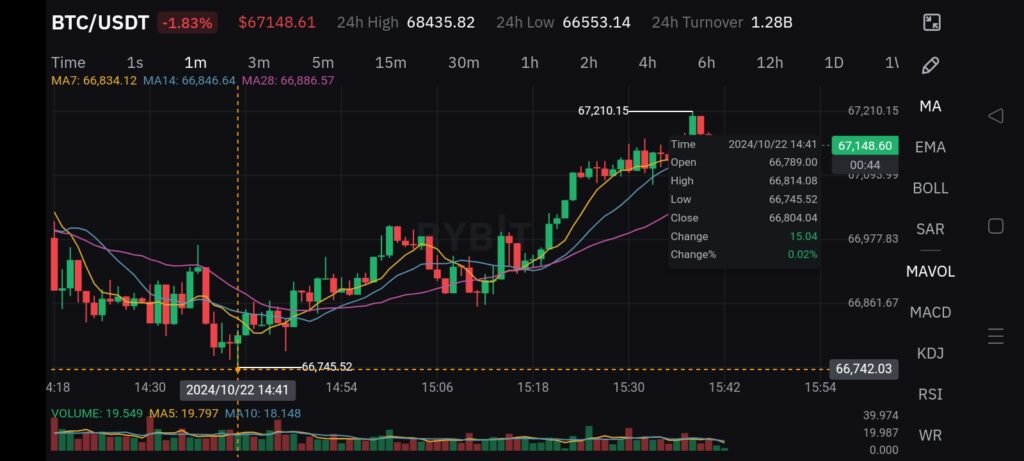Cryptocurrency scams 2024
Scammers are making plans and always looking for new ways to steal people’s money. The massive growth in cryptocurrency usage in recent years has created a huge number of opportunities for fraud. Cryptocurrency fraud has reached record levels in 2021. According to a report from blockchain technology company Chainalysis , the equivalent of $14 billion in cryptocurrency was stolen in 2021. If you are interested in crypto, it should be very important to understand the risks involved. This article explains the common types of cryptocurrency scams and how to spot and avoid them.
Cryptocurrency investment Scams
There are many types of cryptocurrency scams. Below are the most common ones.
Fake websites
Scammers sometimes made fake cryptocurrency trading platforms trick unsuspecting users. The domain names of fake sites are usually similar to the domain names of the sites they are trying to imitate. Their differences from the legitimate sites are so minor that they are difficult to recognize. Fake cryptocurrency sites often operated in following ways:
- Like phishing pages. All the data provided on them, such as the password for the crypto wallet and the phrase for restoring funds, as well as other financial information, fall into the hands of fraudsters.
- As a simple theft. Initially, the site allows you to withdraw a small amount of money. This creates the impression of reliability and profitability of investments, which leads to an increase in the invested amount. However, upon subsequent attempts to withdraw funds, the site either closes or rejects the request.
Phishing scam
Crypto phishing often targets online wallet data, such as crypto wallet private keys, which are needed to access the funds inside the wallet. This type of scam is similar to other phishing attacks and involves the fake websites described above. The attackers send an email asking recipients to go to a specially created website and enter the private key details. Once the attackers have this information, they steal the cryptocurrency in these wallets.
Pump and Dump Market Stimulation Schemes
In this case, a specific cryptocurrency or token is promoted by scammers via email or social media: Twitter, Facebook or Telegram. In pursuit of profit, traders rush to buy up this cryptocurrency, which leads to a sharp increase in its price. The scammers then sell their assets at inflated prices, causing the value of the cryptocurrency to plummet. This can happen within minutes.
Fake apps
Another common way to scam cryptocurrency investors is through fake apps available for download on Google Play and the Apple App Store. These apps are quickly detected and removed, but they still cause losses for many investors – thousands of people download fake cryptocurrency apps .
Fake Celebrity Recommendations
To attract the attention of potential victims, crypto scammers sometimes impersonate or claim endorsement from celebrities, businessmen, and influencers. Sometimes this involves selling phantom cryptocurrencies that do not actually exist to new investors. These scams can be quite elaborate, with flashy websites and glossy brochures showing endorsements from celebrities like Elon Musk.
Free giveaways
In this case, scammers promise to return or increase the cryptocurrency sent to them in a so-called giveaway. Smart mailings, often imitating messages from real social media users, can create a sense of legitimacy and urgency in users. Seeing such a “once in a lifetime” opportunity, users quickly begin transferring funds in the hopes of instant profit.
Blackmail and extortion
Another method used by scammers is blackmail. They send emails claiming to have evidence of the user visiting adult websites and threatening to reveal it unless they receive the private key or a ransom in cryptocurrency.
Cloud Mining Scam
Cloud mining companies allow you to rent mining equipment from them for a fixed fee and a share of the expected profits. In theory, this allows you to mine cryptocurrency remotely without having to purchase expensive mining equipment. However, many cloud mining companies are scams or, at best, inefficient. When working with them, the user either loses money or earns less than expected.
Initial Coin Offering Scam
An initial coin offering (ICO) is a way for crypto startups to raise funds from future users. Typically, customers are promised a discount on new cryptocurrencies in exchange for investing in existing cryptocurrencies, such as Bitcoin or other popular cryptocurrencies. Some ICOs have proven to be scams , with the perpetrators even renting offices and creating high-quality marketing materials to deceive investors.
How to Recognize Cryptocurrency Scams?
So, how to recognize crypto scams? Let’s list the main points to pay attention to.
Promises of guaranteed profits: No investment can be guaranteed to be profitable: its market value can rise as well as fall. Any cryptocurrency-related offer that promises guaranteed profits is a suspicious sign.
A shallow or non-existent whitepaper: A whitepaper is one of the most important attributes of an initial coin offering, so every cryptocurrency should have one. This document should describe how the cryptocurrency is structured and how it will work. If the whitepaper is shallow or, even worse, non-existent, beware.
Aggressive Marketing: All companies use advertising. However, crypto scammers use aggressive marketing to attract users: online advertising, influencer advertising, offline promotion, and other methods. Their goal is to reach as many people as possible in the shortest possible time and get money quickly. If cryptocurrency advertising seems too intrusive and contains unrealistic claims that are not supported by facts, take your time, do your own research and gather information.
Anonymity of the team: For most investment companies, it is possible to find out who their key employees are. This usually means that information about the key employees who manage the investments is available, as well as an active presence of the company on social media. If it is not possible to find out who is managing the cryptocurrency, this is a warning sign.
Easy money: Any investment offer that promises easy money, cash or cryptocurrency is likely to be a scam.
How to protect yourself from cryptocurrency fraud?
Many crypto scams are quite complex and look convincing from the user’s point of view. To protect yourself from crypto scams, it is recommended to take the following measures.
Protect your wallet . Investing in cryptocurrency requires a wallet with private keys. Asking for your keys to participate in a profitable investment deal is likely a scam. Keep your wallet keys secret.
Monitor your wallet app . When you first transfer, send a small amount of funds to ensure that the crypto wallet app is legitimate. If you see suspicious activity when updating the app, stop updating and delete the app.
Invest only in instruments you understand . If you don’t understand how a certain cryptocurrency works, it’s recommended to take your time and study it in more detail before deciding to invest.
Take your time . Scammers often use high pressure tactics, promising bonuses and discounts for immediate participation, to force users to invest funds faster.
Don’t trust social media ads . Fraudsters often use social media to promote their scams. To increase user trust, ads may unauthorizedly use images of media personalities or famous businessmen, or offer gifts or easy money. Maintain a healthy skepticism and exercise due diligence if you come across cryptocurrency investment ads on social media.
Ignore cold calls . If someone tries to offer you an opportunity to invest in cryptocurrency out of the blue, it’s probably a scam. Never give out personal information or transfer money to anyone who contacts you in this way.
Download apps only from official platforms . There may also be fake apps in the Google Play Store or Apple App Store, but downloading apps from these platforms is safer than from other sources.
Do your research . Most popular cryptocurrencies are not scams. But if you haven’t heard of a cryptocurrency, do your research: find out if there’s a whitepaper and read it, find out who’s hosting it, how it works, and find reputable reviews and testimonials about it. To avoid being scammed, check if it’s on an up-to-date, reputable list of fake cryptocurrencies.
Offer that is too tempting . Companies that promise guaranteed profits or instant riches are likely to be scams. If the offer seems too tempting, proceed with caution.
As with any type of investment, never invest the last money you can’t afford to lose. Even without a scam, cryptocurrency is a volatile speculative instrument, so it’s important to understand the risks.
What to do if you are a victim of cryptocurrency fraud?
Cryptocurrency scams can have disastrous consequences for the victim. If you have made a payment or disclosed personal information, it is important to act quickly.
Contact your bank immediately if you:
- Made a payment using a debit or credit card.
- Payment was made by bank transfer.
- Provided your personal information.
Cryptocurrency scammers often sell the data they receive to other cybercriminals. So, to prevent further damage, it is important to change the names and passwords for all accounts. If you have been the victim of a crypto scam on social media, you can report it on the relevant platform. Depending on your country of residence, you can report the scam to the appropriate authority in your jurisdiction. For example, in the United States, this is the Federal Trade Commission . Other countries have similar organizations.
Frequently Asked Questions (FAQs) About Cryptocurrency Scams
1. How do cryptocurrency scams work?
Answer: Cryptocurrency scams typically involve fraudulent schemes where scammers trick people into sending crypto, promising high returns, or stealing personal information to access digital wallets.
2. Cryptocurrency scams and how to avoid them?
Answer: Common cryptocurrency scams include Ponzi schemes, fake investment platforms, phishing, and fake giveaways. To avoid them, always verify the legitimacy of platforms, avoid too-good-to-be-true offers, and use secure wallets and exchanges.
3. How to identify cryptocurrency scams?
Answer: Cryptocurrency scams can often be identified by promises of guaranteed high returns, pressure to invest quickly, lack of transparency, and unverified platforms or projects.
4. What are the red flags of cryptocurrency scams?
Answer: Red flags include:
- Unsolicited investment offers
- Unrealistic returns with little risk
- Vague or non-existent project details
- Fake endorsements by celebrities or influencers
- Lack of clear contact information.
5. What is a cryptocurrency scam?
Answer: A cryptocurrency scam is a fraudulent attempt to deceive individuals into giving away their digital assets or personal information, typically through fake investments, phishing, or other fraudulent schemes.
6. How to avoid cryptocurrency scams in India?
Answer: To avoid cryptocurrency scams in India, use reputable exchanges, verify the authenticity of projects, avoid falling for promises of quick profits, and never share your private keys or wallet information with anyone.
Conclusion
According to the rules we will provide all the information about cryptocurrency risks and profit values. So, all the risk of cryptocurrency sell and purchase is your’s . We will only predict you the value and chance of profit but we are not 100 percent shore.
So, the choice is your’s. But if you need any further information about any cryptocurrency so contact us with our contact us page.








Can you give me a suggestion that how can i protect my bybit crypto wallet from scam
firstly complete your kyc and then on 2 factor authentication and dont click on any unknown link